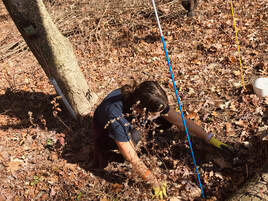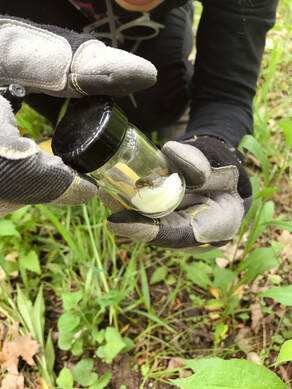Janey LienauPh.D. Student
Yale School of the Environment EducationMESc, 2023 Yale University
B.S., 2020 Wheaton College, Environmental Science Curriculum VitaeClick here for CV.
Current ResearchMy research focuses on soil food webs and understanding how macro-invertebrates influence nitrogen cycling. The main goal of my master’s thesis is to investigate the relationship between soil food web predators and nitrogen cycling in eastern temperate forests. The ground beetle family (Coleoptera: Carabidae) has some of the most abundant predators in forest soil food webs. Despite a long history of carabid study, their role in nitrogen cycling remains largely undescribed. As predator generalist they likely control populations of ant, mites, millipedes, and other invertebrate decomposer groups that fragment plant litter and influence nitrogen cycling. I am conducting my research at the Yale Myers Forest using a stable isotope of 15N to trace the flow of nitrogen from the soil litter layer to invertebrate groups and ground beetles collected in pitfall traps. My hope is to better understand how these trophic interactions in soil invertebrate groups are important for decomposition, nitrogen cycling, and ecosystem function.
|
ContactEmail: [email protected]
Twitter: @janey_lienau LinkedIn: https://www.linkedin.com/in/janey-r-lienau/ |
Previous Research
|
I was an intern under the mentorship of Drs. Meghan Midgley and Robert Buchkowski in the Soil Ecology lab at The Morton Arboretum’s Center for Tree Science in Lise, Illinois from January 2020 – August 2021. We investigated how tree species influence soil properties and invertebrate food webs. As a Research Experiences for Undergraduates (REU) student during the pandemic in 2020 I learned R Studio to use data from the National Ecological Observatory Network to investigate differences in abundance and diversity of ground beetles between forest types across four sites in North America. We found that evergreen forests drive variation in ground beetle diversity and density but the mechanism for this difference needs to be more fully investigated. We conducted a second study in 18 monoculture arboretum forestry plots to survey differences in macro- invertebrate communities across leaf types and mycorrhizal associations. We surveyed invertebrate groups using coverboards and conducted a series of soil analysis. Likely due to the influence of mycorrhizal association on soil properties, mycorrhizal association was a strong predictor of community composition. However, relationships between soil food webs, soil properties, and tree species needs to be more fully investigated, which brought me to my current work in the Schmitz Lab.
|
Publications
Evergreen abundance drives ground beetle diversity and density in eastern temperate forests
(in revision).
Tree traits predict the abundance and diversity of soil organisms across century-old monocultures (in preparation).
(in revision).
Tree traits predict the abundance and diversity of soil organisms across century-old monocultures (in preparation).



